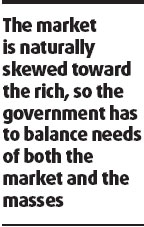Free market gets a helping hand
Liaoning may be an economist's dream for comparative study. First, it was the success story of a planned economy; then, it was a failure of the planned economy; and now, it is poised for a new role in a market economy.
But wait! It is hardly the ideal case for a free-market libertarian. When 1.78 million lost jobs at the height of the State economic reshuffle in 2001, there was no safety net to catch those falling through the yawning cracks. This could be seen as a double failure of both economic systems.
Government policies in recent years are literally lifting millions out of poverty. Families with no income are guaranteed at least one job, albeit a low-paying one. Those who want better jobs are offered free, no-strings-attached training programs. Those who set eyes on entrepreneurship are given a helping hand and a slew of financial incentives on the condition that they employ a certain percentage of laid-off workers. Children from poverty-stricken families receive subsidies for vocational or advanced education.
It all sounds like a step back to the good old days when government took care of everything, from jobs and housing, to cradle-to-grave insurance. But it is not. These measures constitute a calibration for the best possible form and degree of government intervention. "The market is not omnipotent," said Lu Xin, vice-governor of Liaoning and an accomplished economist. "There is no country without government intervention. The key is how to do it."
For example, over the past two years, the Liaoning government has bought off 308,000 of workfare jobs for cleaning ladies, security guards and such, which, in turn, were offered to those families with no income whatsoever. But its no-fee service doesn't compete with regular employment agencies because it limits its role to segments where market mechanisms do not function properly. If you want a 2,000-yuan job as a care-taker, the government cannot dole out one. But it can offer you free training that may lead you to it.
The current approach has replaced the complacency of the old days with a drive to acquire new skills and move ahead. Yes, the government will ensure everybody has food on the table and a place to shelter from rain and cold, but those are the bare essentials. If you want to improve your living standard, you'd better graduate from the government greenhouse into the market battleground. "Once a job category matures, the government withdraws," noted Vice-Governor Lu.
Public spending should address the fairness issue, she explained. It takes collaboration between government and market forces, but government has to be "open-minded and smart". It is actually a tango of three: The market is naturally skewed toward the rich, so the government has to balance needs of both the market and the masses.
It is easier to change a mechanism than a mindset. The free-wheeling market is in, but the fascination with the well-entrenched endowments takes longer to exit the scene. For all the vestiges, it is definitely on the way out. Nowadays when you talk to a newly idle worker, he'll more likely ask the government for a small loan and job training than a simple handout.
That is perhaps a better kept secret that will blossom into many more miracles.
(China Daily 06/28/2007 page25)














